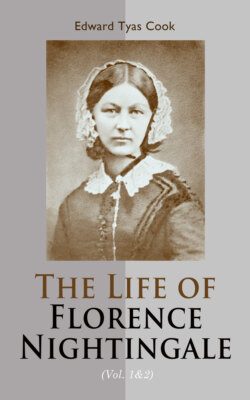Читать книгу The Life of Florence Nightingale (Vol. 1&2) - Edward Tyas Cook - Страница 49
На сайте Литреса книга снята с продажи.
V
ОглавлениеHaving lived and learnt among the Protestant Deaconesses in Germany, Miss Nightingale was next determined to do the like among the Catholic Sisters in France. She sought the good offices of Manning, whose acquaintance she had made in Rome five years before, and who had now lately been received into the Roman Communion. Manning put himself into communication with his friend, the Abbé Des Genettes, in Paris. The Abbé obtained leave from the Council of the Sisters of Charity for the English lady to study their institutions. It had been explained to him that Miss Nightingale was also desirous of studying the hospitals in Paris. The Abbé accordingly selected a House belonging to the Sisters which would offer every advantage in this respect. Her cousin, Miss Hilary Bonham Carter, who was intent on the study of art and had been invited to stay with M. and Madame Mohl, was to accompany her to Paris; and Lady Augusta Bruce was also to be of the party. It was in the salon of Madame Mohl that Lady Augusta met her future husband, Dean Stanley.
Thus, then, it had been arranged. The necessary authorization from the Sisters had been obtained in September. The start was to be made in November. But as the time approached, Mrs. Nightingale drew back. She wrote of the plan, not as something agreed upon, but as a new proposition. “I am afraid,” she said to Aunt Mai, “that Flo is thinking of some new expedition, perhaps to Paris. I cannot make up my mind to it.” Florence was staying at a friend's house in London. Her father came in, and reported that her mother was greatly distressed. There was company coming to Embley, and could Florence have the heart to leave her mother? “Parthe would be in hysterics.” Every one would be in despair. Could she not delay? An aged kinswoman, moreover, was ill, as already related. Florence yielded, perhaps more to this last consideration than to the others, and the start was postponed. There was a lingering hope that the expedition to Paris might be abandoned, and a suggestion was made to that end. Why must Florence go to the Sisters, and Roman Catholic Sisters, too—abroad? Why should she not stay at home, and conduct some small institution on her own account? There was a house available for such a purpose at Cromford Bridge, close to their own Lea Hurst, and Mr. Nightingale would provide the necessary funds. In this way the best might be made of both worlds—of theirs, and of hers. Florence was touched, but remained of her own mind:—
(To her sister.) January 3. Oh, my dearest Pop, I wish I could tell you how I love you and thank you for your kind thoughts as received in your letter to-day. If you did but know how genial it is to me, when my dear people give me a hope of their blessing and that they would speed me on my way! as the kind thought of Cromford seems to say they are ready to do. I will write to Mama about Paris and Cromford. My Pop, whether at one or the other, my heart will be with thee. Now if these seem mere words, because bodily I shall be leaving you, have patience with me, my dearest. I hope that you and I shall live to prove a true love to each other. I cannot, during the year's round, go the way which (for my sake, I know) you have wished. There have been times when, for your dear sake, I have tried to stifle the thoughts which I feel ingrained in my nature. But, if that may not be, I hope that something better shall be. If I ask your blessing on a part of my time for my absence, I hope to be all the happier with you for that absence when we are together.
Miss Nightingale refused Cromford Bridge House: it was most unsuitable for the purpose; the only more unsuitable place was the “Forest Lodge” at Embley, which her sister Parthe had suggested. In the following year, Florence joined the Sisters of Charity in Paris. And thus, after many struggles and delays, was she launched upon her true work in the world.
